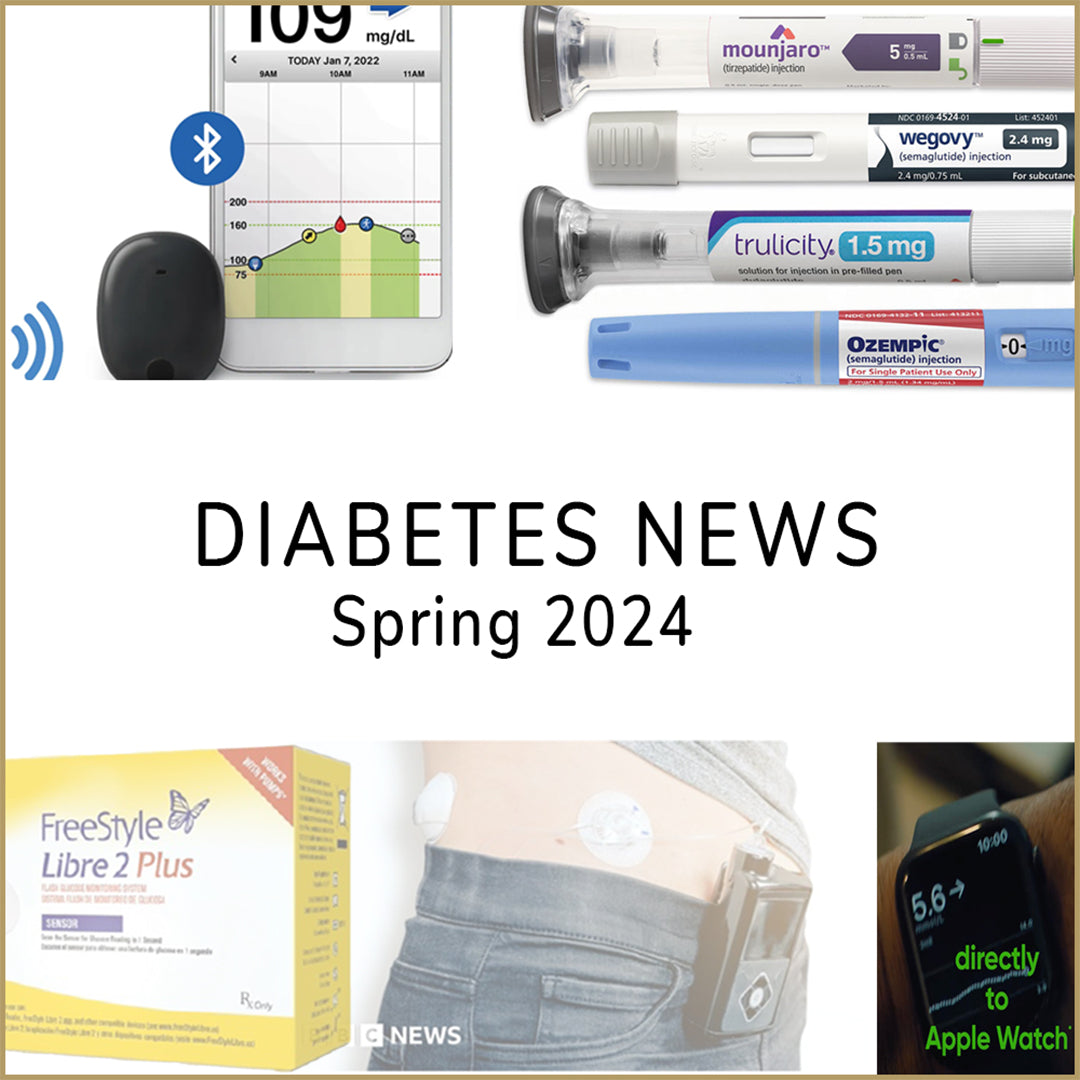Last updated 31 January 2024
DIABETES NEWS
In this update we are covering the news stories from end of December 2023/January 2024, keeping you informed whether you are managing your own diabetes or doing so as a carer.

T1DE INQUIRY REPORT PRESENTED TO GOVERNMENT
Former Prime Minister (and T1D), Theresa May, and Sir George Howarth MP, have presented a report to government on their Inquiry into Type 1 Diabetes and Disordered Eating (T1DE).
T1DE involves individuals restricting insulin intake to control their weight with the consequence of erratic blood sugar levels and likelihood that this leads to malnutrition along with physical and mental health issues such as depression and anxiety. Ultimately it can lead to death.
The condition is estimated to affect around a quarter of type 1s but it's hoped that recommendations from the report could lead to earlier intervention and treatment. Further research was identified and pilot schemes are already underway in 8 areas of England to create integrated services supporting those recovering from T1DE.
Read more about the Inquiry here.
During the course of speaking about T1DE, Theresa May revealed that her "go-to" hypo treat is jelly babies!

NICE FINALISE HCL GUIDELINES
- HbA1c is greater that 7.5%
- or, person experiences disabling hypos
NHS 5-YEAR STRATEGY FOR HCL
Plans for the rollout of hybrid closed loops by NHS England have now been published. The strategy is designed to ensure that eligible patients across England receive equitable and fair access to HCL technologies and the medtech is cost-effective to the NHS.
HOW TO CHOOSE BETWEEN DIABETES TECHNOLOGY
This new NHS publication is a fantastic resource now available to help guide patients and healthcare professionals through the choices when it comes to medtech for type 1 management.
Filled with explanations and useful information, there are really helpful charts comparing CGMs and pumps available on the NHS.
Click here to download.
AIR POLLUTION INCREASES SEDENTARY LIFESTYLE
A study by NIHR Leicester Biomedical Research Centre has found that breathing in polluted air leads to an additional 22 minutes of being sedentary every day - time spent lying, reclining, sitting or standing still.
It's thought air pollution may affect people’s ability to exercise, or their enjoyment of exercise, and this could increase their risk of developing chronic diseases.
LIBRE 3 NOW ON NHS DRUG TARIFF
FreeStyle Libre 3 is now listed on the NHS drug tariff and so should become available for prescription shortly. However, it's expected that this will only be an option for those on hybrid closed loop systems. The price to the NHS is listed as £42, compared to £35 for a Libre 2 sensor.
Click here for more.
In other news from Abbott, sales of FreeStyle Libre CGMs resulted in income of $4.3 billion for 2022, a 22% increase year over year. The company's goal is goal to reach $10 billion in sales for its Libre diabetes devices by 2028.
Click here to find out more.
2024 ADA UPDATED STANDARDS OF CARE FOR US PWD
The American Diabetes Association have published their updated Standards of Care with guidelines that include the use of hybrid closed loops and CGMs.
These set out the standards that PWD should expect in terms of their diabetes treatment and care, and can have global impact where other countries look to follow.
Read more here.
CE MARK FOR NEW MEDTRONIC SENSOR
Medtronic have received a CE mark for a new sensor called Simplera Sync, approved to work with its MiniMed 780G pump.
Like other CGMs such as the Freestyle Libre, the Simplera Sync is a disposable sensor that doesn’t require calibration, although it has a shorter wear time of 7 days.
Medtronic plan to offer the 780G with Simplera Sync through a limited launch this spring, with a full launch in Europe over the summer. It is not currently approved by the FDA for use in the US.
Read more here.
FIRST HCL ANNOUNCED USING LIBRE 2 PLUS & T:SLIM X2 IN US
Tandem have announced that the t:slim X2 insulin pump now integrates with the newly available Freestyle Libre 2 Plus sensor.
The 15 day sensor is intended for use with pumps and will be the first hybrid closed loop, also referred to as an automated insulin delivery system, available to Libre's US customers.
Read more, click here.
DEXCOM ANNOUNCE STELO FOR TYPE 2s IN US
Dexcom have announced a new glucose sensor designed specifically for people with type 2 diabetes who do not use insulin, called Stelo.
Based on the current G7 CGM sensor, Stelo will give users 15-days of wear and use an app tailored specifically for non-insulin users. The system is expected to launch in the US this summer.
Read more here.
DEXCOM PARTNERS WITH IRISH RUGBY & INVESTS IN NEW PLANT FOR EUROPEAN PRODUCTION
Dexcom have announced a historic 12-year naming rights partnership with Connacht Rugby which sees the rugby club's Sportsground Stadium being renamed the "Dexcom Stadium".
The move raises the profile of Dexcom in Ireland, ahead of their new factory being built in western Ireland, see below.
Read more on this story here.

Dexcom have also announced a new manufacturing site in Athenry, Co Galway, creating up to 1,000 new jobs. This is the first site for the company in Europe and will boost Dexcom's ability to reach customers not just in Ireland, the UK and Europe, but also help expansion into the Middle East and other territories.
Read press release here.
DIABETES EVENTS
TAD TALK 2024 ANNOUNCED
Talking about Diabetes is an annual event aimed at inspiring those with the condition to think differently about diabetes. Set up by Prof Partha Kar, and 2 other doctors, the talks often involve T1s in the public eye such as previous speakers James Norton and Ed Gamble.
This year it's being held in Liverpool on 25th May. Find out more here.
UNITED THROUGH DIABETES 2024
DRWF (Diabetes Research & Wellness Foundation, a UK charity) have announced that following the success of their first 'United Through Diabetes' Conference in 2023, the event will be back on 21st September 2024.
Held at Chesford Grange in Warwickshire, the conference offers attendees lots of different options of talks & workshops run by healthcare professionals, experts, researchers and medtech providers, covering type 1 and 2 diabetes.
It's an all day event and delegate registration is just £10 for adults with family and children's tickets also available. Lunch, refreshments & a delegate bag are included.
Find out more about the event here.
DIABETES RESEARCH
ORAL MEDICATION FOR DIABETES TO BE TRIALLED IN 2025
A new way of taking insulin will be trialed in 2025 following successful testing on baboons.
The University of Arctic in Norway have developed a new way to supply the body with smart insulin that could avoid the need for pwd to inject. Insulin can be eaten by taking a capsule containing tiny nano-carriers which encapsulate insulin and deliver it to the liver, where it is broken down only when glucose levels are high.
The Professor behind the project explained “This way of taking insulin is more precise [than injecting or using a pump] because it delivers the insulin rapidly to the areas of the body that need it most."
Click here to learn about the study.
HIGH BLOOD SUGAR LINK TO FROZEN SHOULDER
Researchers at the University of Exeter have found that high blood sugar can cause upper limb problems more prevalent in people with diabetes, or who are obese.
Until now, the cause of these conditions wasn't know. The researchers used genetic techniques across a range of musculoskeletal problems, which led them to conclude that having raised glucose levels over the long term can increase the risk of frozen shoulder, Dupuytren’s disease, carpal tunnel syndrome and trigger finger. These can now be classified as diabetes complications.
Read more about the research here.

DIABETES 'CURE' IN SIGHT
A report in the Daily Mail, refers to a breakthrough made by US researchers that have been injecting mice with spleen cells from healthy animals which have in-turn halted the disease and rebuilt the pancreas.
The research is at an early stage but described by Diabetes UK's Research Director as "potentially very exciting", particularly for type 1s. Human trials are due to start soon.
Read the full article in the Daily Mail. Click here.
INSULIN SPRAY COULD REPLACE MDI
Norwegian company, InsuLife, are aiming to eliminate the need to use needles for injecting insulin with the first spray-on insulin.
A clinical trial will start shortly to test the company's method of spraying insulin onto participants inner forearm and testing different doses to see if they are as effective as injections at reducing blood sugar levels.
Find out more about this trial here.
WHY DON'T FRUIT BATS GET DIABETES?
Fruit bats consume twice their body weight in sugary fruit over a 4 hour period, every day. And, now a team of researchers from the University of California, San Francisco are looking into the biological adaptions that has given fruit bats a genetic system that controls blood sugar without fail.
The fruit bat's pancreas has evolved to have extra insulin producing cells to help it process an immense amount of sugar and kidneys adapted to retain electrolytes. It's hoped that learning from the study could lead to better insulin, or sugar-sensing therapies, for people.
Read this article here.
REGENERATING INSULIN CELLS POSSIBLE TREATMENT TO AVOID MDI
Researchers from the Baker Heart and Diabetes Institute, in Australia, have demonstrated that newly made insulin cells can respond to glucose and produce insulin following stimulation using cancer drugs already approved, making a difference in just 48 hours.
The approach has the potential to become the first modifying treatment for type 1 diabetes and could reduce. or even eliminate, the need for multiple daily injections.
Awakening insulin-producing cells was shown to be possible in those aged 7-61 years old.
Read more here.
GENE THERAPY BRINGS CURE 'IN SIGHT'
Another article in the Daily Mail reports on research by Canadian and Korean experts who have found a way to replace malfunctioning genes in rats and mice, with an injection than puts type 1 diabetes into remission.
That's it, you're up-to-date!
Thank your for reading. We hope you've found these stories insightful. If you have any comments please email us - hello@lovemylibre.com
If you're not currently a member of our community please join us by signing up below. We look forward to welcoming you!

Blogs and publications on this website are independent of any involvement by medtech companies or diabetes related charities. To ensure there is no bias, we do not accept any products, freebies or other material from any medtech provider. Except where credited otherwise, all materials are copyright ©️Love My Libre Ltd.
Love My Libre is not associated or affiliated with Abbott or FreeStyle Libre. Content here and on our website www.lovemylibre.com does not constitute medical advice or replace the relationship between you and healthcare professionals nor the advice you receive from them.
The author of this blog has type 1 diabetes and uses the FreeStyle Libre 2 which is provided on NHS prescription.









Leave a comment (all fields required). Please note, we are unable to respond to individual comments posted here.